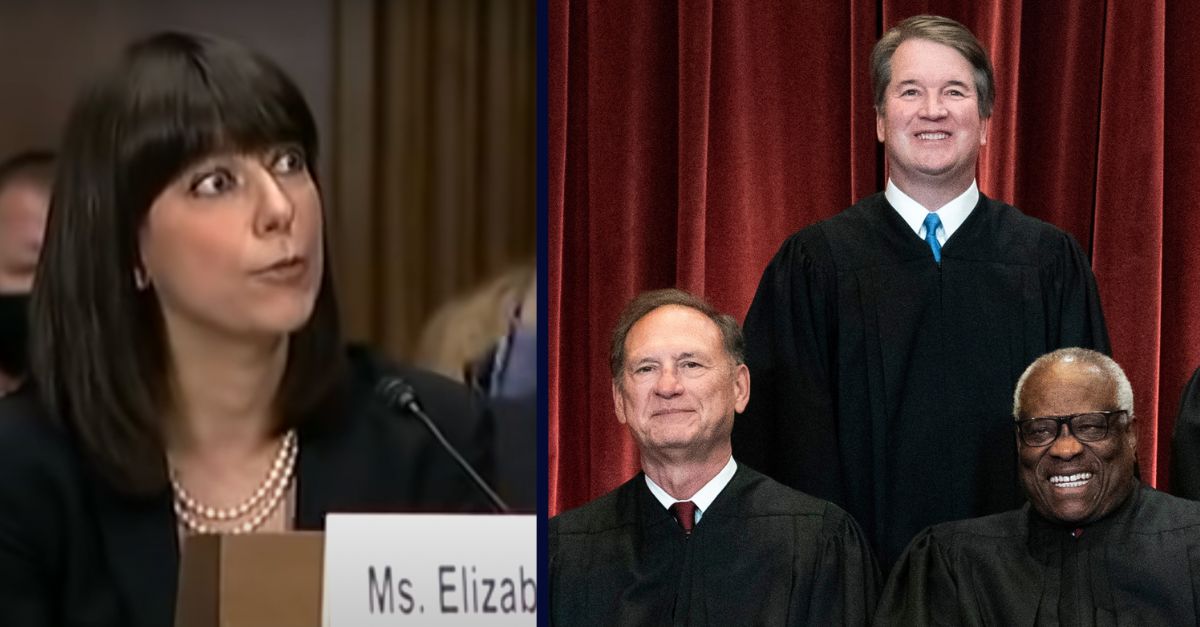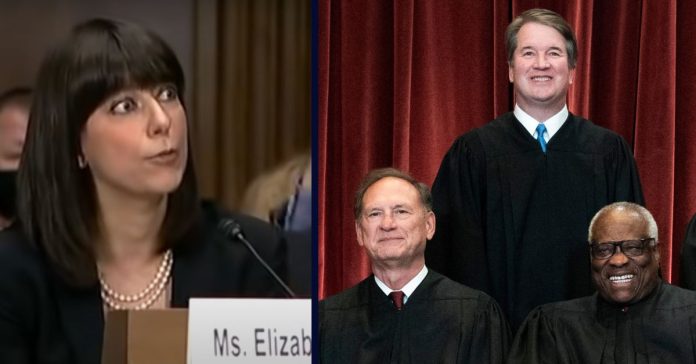
Right: Justices Brett Kavanaugh, Samuel Alito, and Clarence Thomas of the Supreme Court. Erin Schaff/The New York Times via AP, Pool)
The U.S. Supreme Court heard oral arguments Tuesday in a case with major implications for the future of gun rights. In an appeal from a ruling by the most conservative appeals court in the nation, the Biden administration asked the justices to keep guns out of the hands of domestic abusers by refining the law handed down by a ruling handed down by the Court in 2022.
What is at issue in the case?
The Biden administration is appealing a ruling by the Trump-packed U.S. Court of Appeals for the Fifth Circuit in United States v. Rahimi. At issue in the litigation is the fate of 18 U.S. Code § 922 (g)(8) , a federal law that restricts domestic abusers from possessing firearms. The statute itself restricts individuals from gun possession if they are “subject to a court order that restrains [them] from harassing, stalking, or threatening an intimate partner” — and applies even if the court order in question is a civil, not criminal, one.
The government, represented by Solicitor General Elizabeth Prelogar, argued that Section 922(g)(8) is a key provision because those subject to domestic violence protective orders are “an obvious danger to their intimate partners” given the very strong link between guns and homicides. The Biden administration contends that the decision by the Fifth Circuit “endangers victims of domestic violence, their families, police officers, and the public.”
Perhaps an even broader consequence is the future of the Supreme Court’s recent ruling in New York State Rifle & Pistol Association v. Bruen, in which the 6-member majority leaned hard on the “historical” basis for gun rights. They expanded on the 2008 District of Columbia v. Heller decision and the 2010 ruling in McDonald v. Chicago as it struck down New York’s gun-licensing regulations.
The Biden administration presented fierce arguments not only on behalf of Section 922(g)(8) itself, but also for a ruling clarifying — or perhaps, narrowing — Bruen.
Rahimi is the first handgun case before the Supreme Court since the Bruen ruling.
History and tradition
In Bruen, Justice Clarence Thomas wrote for the majority that the Second Amendment is an “unqualified command,” and that accordingly, gun regulations can only meet constitutional requirements when they are “consistent with this Nation’s historical tradition of firearm regulation.” The ruling built upon the Court’s 2008 ruling in District of Columbia v. Heller, in which Justice Antonin Scalia said the Second Amendment’s guarantees only apply fully to “ordinary” or “responsible” law-abiding citizens. The Biden administration contends that Rahimi and other domestic abusers do not fall into the category of responsible law-abiding citizens who are entitled to full gun rights.
Throughout her colloquy with the justices on behalf of the Biden administration, Prelogar spoke to the justices using their own words, missing no opportunity to argue that “historical tradition” actually favors her argument in the case.
For example, when Chief Justice John Roberts asked whether “irresponsible” or “dangerous” are too vague or subjective to be persuasive, Prelogar reminded him that she was not using the words in their colloquial sense. Rather, Prelogar argued, “history and tradition” provide a rich context for what the terms mean.
“Irresponsible” corresponds only to precedent directly related to the specific danger of gun possession, Prelogar explained. She offered that “irresponsible” has historically been used to distinguish a person who may not be legally culpable for reasons of age or mental disability, but in whose hands a firearms would present a particular danger.
The history and tradition of the word “dangerous” also supports labeling a domestic abuser as such, she continued.
“So there’s no daylight at all then between “not responsible” and “dangerous,” pressed Justice Brett Kavanaugh.
An unwavering Prelogar answered, again quoting the justices’ own words: “Yes, that’s what history and tradition said.” She expounded, telling Kavanaugh that in the past, the Supreme Court itself has consistently interpreted those terms in just the way the Biden administration urges it to do now.
Justice Amy Coney Barrett joined the conversation to raise an interpretive question of her own.
“So it’s not a synonym for ‘virtue,”” queried Barrett about the term “responsible.”
Prelogar bluntly rejected Barrett’s suggestion and said the term is clearly linked to dangerousness with firearms, and not to amorphous concepts of responsibility.
In addition to figuratively meeting the conservative justices where they were on the matter of “historical tradition,” Prelogar also offered an alternative take on the framework set out by Thomas in Bruen. Throughout her argument, the solicitor general argued that history and tradition are perhaps not the stalwart beacons of freedom the conservative majority has held them up to be.
Prelogar made a glaring point, beginning with Thomas as her primary audience: A look into the nation’s history and tradition, she argued, reveals that the Second Amendment was meant not to apply to entire groups of people, and slaves and Native Americans were excluded. The theme reemerged several times throughout the nearly two hours of oral arguments. In the founding era, such categories of people were not considered to be “among the people protected by the Second Amendment,” and generally stripped of other rights as well, Prelogar contextualized, denouncing the inequality as “odious.”
Justice Ketanji Brown Jackson later suggested, “Is there a flaw with history and tradition? Are we only considering history of some of the people?”
Prelogar also cleverly worked in a key debate point about “historical tradition” in a round of questions from Thomas. When the conservative justice, often known for skepticism about overreaching administrative power, asked Prelogar whether she would change her position if Rahimi had been the subject of an administrative order, as opposed to a civil order, Prelogar again used some of the justice’s own logic in her argument. She responded that an administrative determination would be different, but that more modern American law supports the distinction — as contrasted with “historical” (or English) legal principles.
When Jackson questioned Prelogar, she raised yet another key point with respect to the role of “historical tradition” in the context of gun rights for domestic abusers. The justice, making a key point to the conservative majority via question to Prelogar, noted that historically, men — including domestic abusers — were not perceived as “dangerous” from a standpoint of disarmament.
“What would we do with that?” asked Jackson. “What’s the point of going to the founding era if we are still using modern standards?”
Unraveling arguments
When Assistant Federal Public Defender Matthew Wright took the podium to argue on Zackey Rahimi’s behalf, the case appeared to unravel quickly as even some of the conservative justices appeared to take issue with Wright’s position.
Barrett pointed out that Wright’s client had not been stripped of rights without due process. Rather, Barrett said, Rahimi’s girlfriend submitted a sworn affidavit attesting to the man’s history of violence.
Likewise, Roberts, a member of the Bruen and Heller majorities, pointedly asked Wright, “You don’t have any doubt that your client is a dangerous person do you?”
Wright refused to acquiesce to Roberts’ point of view.
“I would want to know what ‘dangerous’ means,” countered the lawyer.
“Well, someone who is shooting at people — that’s a good start, isn’t it?” asked Roberts rhetorically as the gallery and justices chuckled.
It was Justice Elena Kagan, however, who offered a truly pointed critique of Wright’s performance at the podium.
Kagan said, “I’ll tell you the honest truth Mr.Wright, I feel like you are running away from your argument.”
Referring to the relationship between Rahimi’s significant history of violence and his argument that he should be permitted to have a gun, Kagan said,”The implications of your argument are just so untenable that you have to say ‘that’s not really my argument.’”
The justice continued, underscoring her point:
Your argument applies to a wide variety of disarming or bans that we take for granted now that it’s so obvious that people who have guns pose a great danger to others, and you don’t give guns to people that have the kind of history of domestic violence that you client has, or to the mentally ill. You seem to be running away from [your argument] because you can’t stand what the consequences of it are.
On rebuttal, Prelogar did not directly address Wright’s argument. Rather, she declared the case an “easy” one and focused her comments on the disturbing statistics that provide a practical foundation for the statute in question.
“A woman who lives in a house with a domestic abuser is five times more likely to be murdered if he has access to a gun,” Prelogar said.
She then continued with a reminder that the risks of firearms affect law enforcement as well.
“Domestic violence calls are the most dangerous type of call for a police officer to respond to in this country,” Prelogar said, “and for those officers who die in the line of duty, almost all of them die because of handguns.”
You can listen to the full oral arguments here.
Have a tip we should know? [email protected]

